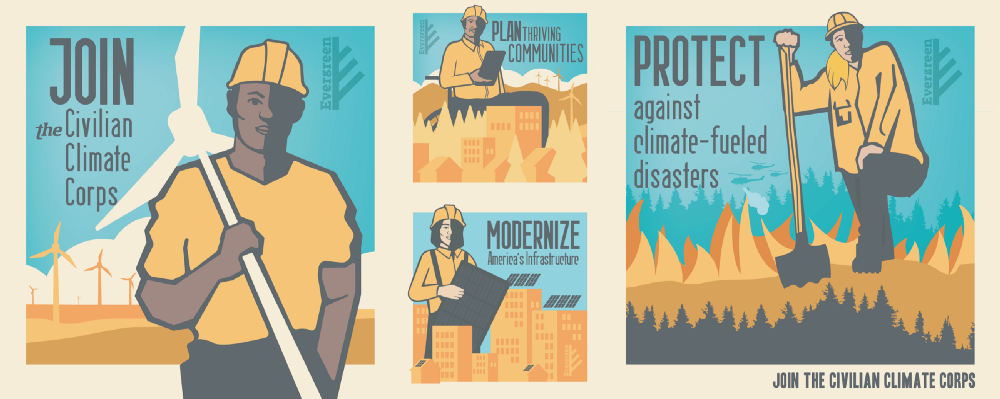“When I think of climate change, I think of jobs.” President Biden has long echoed this mantra, from the early days of his presidential campaign, to his first days in the White House. Now, as he approaches a year into his presidency, how does President Biden plan to deliver on this promise?
On his first day in office, Biden signed an executive order enacting the creation of a Civilian Climate Corps (CCC). Modeled on the Civilian Conservation Corps of President Franklin Roosevelt’s New Deal program, Biden’s CCC, if passed, could simultaneously help solve both climate change and post-pandemic American unemployment.
President Biden introduced the Civilian Climate Corps as a component of his Build Back Better Act. Despite the COVID-19 recession lasting a mere two months, from February to April of 2020, its impact makes it the worst economic downturn since the Great Depression. The Build Back Better Act aims to revitalize the U.S. economy and address systemic inequities, gaps in healthcare and education, and the climate crisis. Due to the nature of its high spending and many progressive policies, however, the Build Back Better Act has faced stringent opposition in Congress, primarily amongst Republicans.
Much like Roosevelt’s Civilian Conservation Corps, Biden’s CCC aims to provide well-paying jobs to young people for performing environmental work such as protecting public lands and sustainably improving U.S. infrastructure. Biden vows to pay all Corp employees at least $15 per hour and provide access to health care, transportation, housing and childcare. However, while Roosevelt’s Corps was primarily focused on efforts like fighting wildfires, Biden’s new program will attempt to proactively protect communities from those fires in the first place. Other Corps projects would work to restore wetlands, maintain biodiversity, eliminate invasive species and develop clean energy infrastructure, including solar and wind plants. Through efforts like these, the plan will take a grassroots approach to mitigating and adapting to the effects of climate change.
Yet Biden’s proposal is still relatively vague. Policy-makers have not agreed on the federal department in which the Corps should reside. Although the framework intends to employ over 300,000 Americans, the $10 billion Biden has publicly pledged to spend is far from adequate to fund a program of such proportions. Roosevelt’s Corps, meanwhile, employed over 3 million young men during its lifetime, with a cost of $3 billion total over 9 years, equivalent to just under $6 billion per year in today’s money.
Looking back, Roosevelt’s CCC was not without fault –– some programs actually did more environmental harm than good, largely due to lack of scientific information. The reforestation program planted singular tree species, which reduced biodiversity and made forests vulnerable, while the draining of swamps on the east coast to control mosquitoes decimated migratory bird habitats.
In addition, these ecological missteps were accompanied by a host of social problems. At a time when racial tensions were high, the Civilian Conservation Corps was inherently discriminatory. The program was segregated for Black Americans, and Native Americans were restricted to a completely separate program. Women were excluded entirely. Moreover, the Corps was limited in its scope, as all projects were confined to rural areas, ignoring cities and suburbs all together.
Nevertheless, Biden has made evident his commitment to inclusion and diversity in his proposed Civilian Climate Corps. Currently, women and minorities face higher levels of unemployment and economic insecurity due to the pandemic. To succeed in its goals of post-pandemic recovery and climate justice, the new CCC must be accessible to all, regardless of gender or race. Additionally, research shows the climate crisis disproportionately affects marginalized and minority communities, and the Corps must seek to address these inequities. To do so, the CCC must be more “geographically equitable” by centering projects in urban areas in addition to rural ones. Despite its far-reaching scope, the program must focus on small-scale, local issues, and take community voices into account.
Historian Neil Maher is an expert on the New Deal and the Great Depression era Civilian Conservation Corps. When speaking on President Biden’s Civilian Climate Corps plan, Maher says,
“A new corps could help communities adapt to climate change by building climate-resilient infrastructure, like restored wetlands or green stormwater systems. It could also help mitigate climate change by developing solar and wind energy systems.”
Maher highlights the need for green jobs in the energy sector that prepare young employees for environmentally viable careers. By educating young people on environmental problems and solutions, the Civilian Climate Corps could equip the next generation of leaders to build a sustainable future.
A memo published by the Sierra Club underscores the educational, environmental, and economic benefits afforded by implementing the Civilian Climate Corps. The report refers to a “green recovery” from the pandemic that will create the workforce necessary to protect the 30% of lands and waters needed to avoid many detrimental impacts of climate change by 2030. Additionally, the memo even cites a study which found nearly 70% of Americans support a Civilian Climate Corps, including 62% of Republicans. So why is the Civilian Climate Corps so hard to enact?
In today’s polarized political climate, bipartisan agreement on government spending is hard to come by. Especially because the new CCC is just a small component of Biden’s larger agenda, there is a chance the program will never be implemented. But in the context of a devastating pandemic and an ever-worsening environmental emergency, President Biden’s plan for the Civilian Climate Corps is decidedly necessary. We are in the midst of two of the greatest battles humanity has ever faced, and it’s time to take action. To move forward as a society, we must simultaneously end systemic injustices against both people and planet. By looking to the past and drawing on the legacy of President Roosevelt’s Civilian Conservation Corps, the U.S. today may be able to solve the problems of the future.
Sources
Ackerman, Frank. “A Lesson in US Job Creation: The Civilian Conservation Corps.” TripleCrisis, 18 November 2010, http://triplecrisis.com/a-lesson-in-job-creation-the-civilian-conservation-corps/. Accessed 27 November 2021.
Brickey, Ian. “Memo: A Big, Bold CCC Is Essential to a Green Recovery.” Sierra Club, 29 Sept. 2021, https://www.sierraclub.org/press-releases/2021/09/memo-big-bold-ccc-essential-green-recovery.
Brickey, Ian. “Sierra Club to Congress: ‘Don’t Cut the Climate Corps.’” Sierra Club, 18 Oct. 2021, https://www.sierraclub.org/press-releases/2021/10/sierra-club-congress-don-t-cut-climate-corps.
Casselman, Ben. “Officially, the pandemic recession lasted only two months.” The New York Times, 19 July 2021, https://www.nytimes.com/2021/07/19/business/economy/pandemic-recession-over-coronavirus.html. Accessed 27 November 2021.
“The Civilian Climate Corps (CCC), Explained.” Sunrise Movement, Sunrise Movement, 20 Apr. 2021, https://www.sunrisemovement.org/theory-of-change/the-ccc-explained/.
Daly, Matthew. “Biden, Dems Push Civilian Climate Corps in Echo of New Deal.” AP NEWS, Associated Press, 9 Sept. 2021, https://apnews.com/article/joe-biden-health-climate-business-bills-cb6191bf6155c8a54e556c1ecd8615f9.
Maher, Neil. “The History of the Civilian Conservation Corps.” Resources for the Future, 21 Oct. 2021, https://www.resources.org/archives/the-history-of-the-civilian-conservation-corps/.
MartinVale, Cole, et al. “Contested Agreements at COP26, Plans for Civilian Climate Corps, and More.” Resources for the Future, 12 Nov. 2021, https://www.resources.org/on-the-issues/contested-agreements-at-cop26-plans-for-civilian-climate-corps-and-more/.
“President Biden Announces the Build Back Better Framework.” The White House, The United States Government, 1 Nov. 2021, https://www.whitehouse.gov/briefing-room/statements-releases/2021/10/28/president-biden-announces-the-build-back-better-framework/.
Rott, Nathan, and Scott Detrow. “Reaching Back to the New Deal, Biden Proposes a Civilian Climate Corps.” NPR, NPR, 11 May 2021, https://www.npr.org/2021/05/11/993976948/reaching-back-to-the-new-deal-biden-proposes-a-civilian-climate-corps.
Yoder, Kate. “Biden’s Civilian Climate Corps Comes Straight out of the New Deal.” Grist, 8 Feb. 2021, https://grist.org/politics/bidens-civilian-climate-corps-comes-straight-out-of-the-new-deal/.
Featured image from https://www.evergreenaction.com/blog/evergreen-explains-what-is-a-civilian-climate-corps

